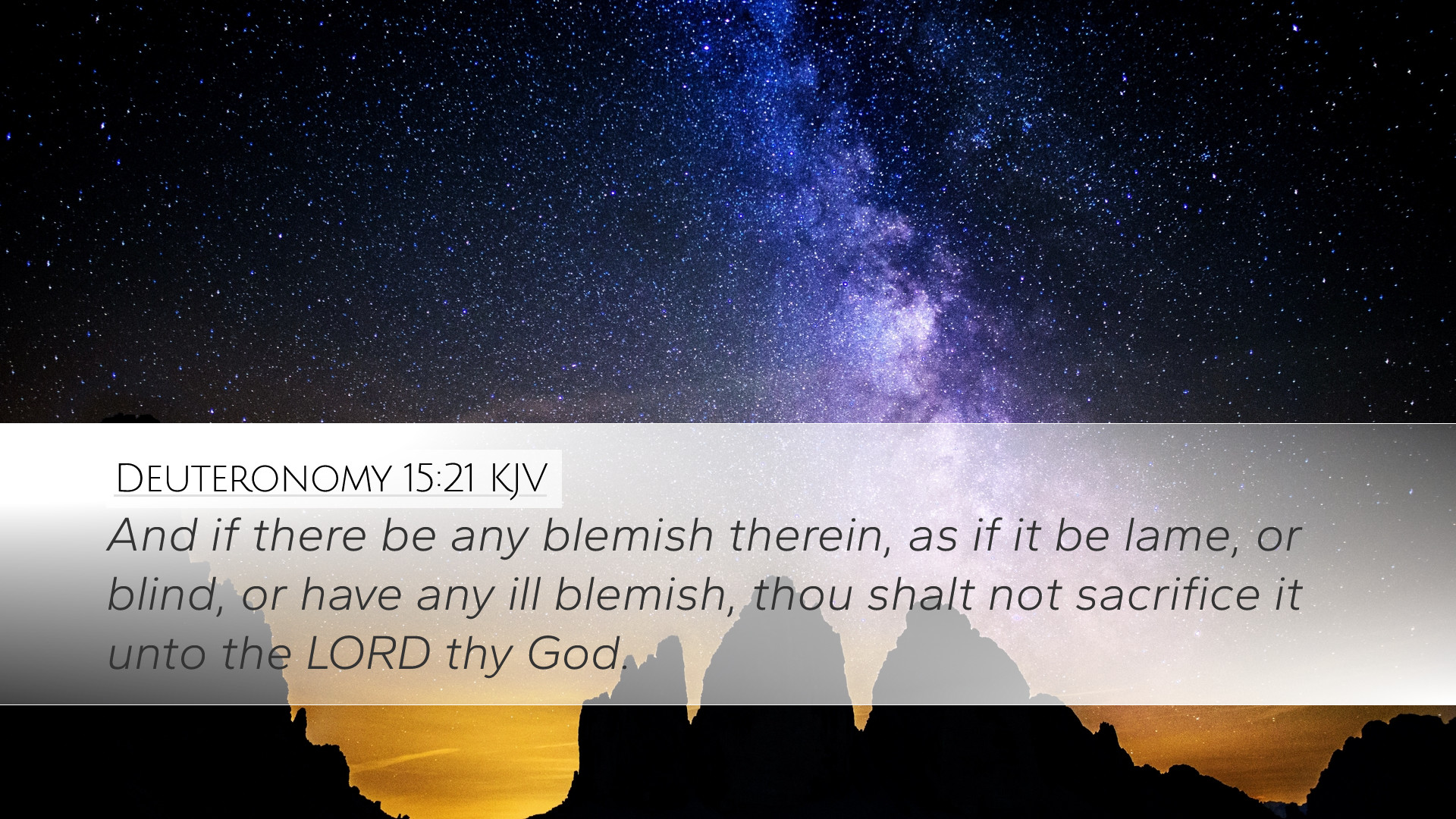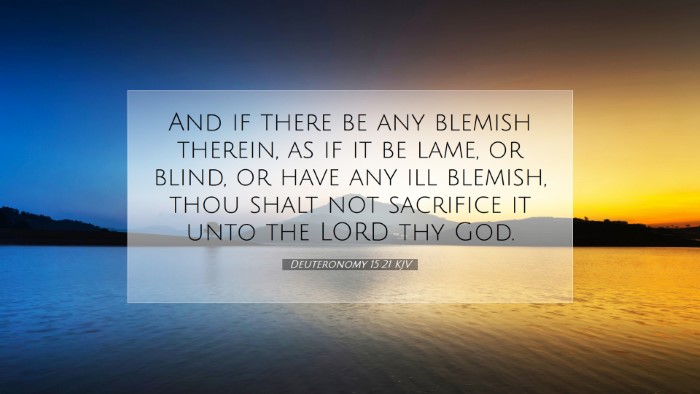Commentary on Deuteronomy 15:21
Deuteronomy 15:21 states, "But if there be any blemish therein, as if it be lame or blind, or have any ill blemish, thou shalt not sacrifice it unto the LORD thy God." This verse appears within the context of the laws regarding offerings to God, particularly focusing on the standards for sacrifices that the Israelites were to bring to the Lord.
Contextual Overview
The book of Deuteronomy serves as a restatement of the law for Israel as they prepare to enter the Promised Land. In this chapter, Moses emphasizes the importance of purity and perfection in the offerings presented to God, which illustrates broader principles regarding acceptable worship.
Insights from Matthew Henry
According to Matthew Henry, this verse highlights God's holiness and the importance of offering only that which is unblemished. He emphasizes that sacrifices are symbolic of one's relationship with God, and therefore, one should offer their best as a sign of respect and devotion. He comments:
- Holiness of God: Henry notes that God requires purity in offerings as a reflection of His nature. Just as God is perfect, so too should be the sacrifices that are brought before Him.
- Personal Reflection: He encourages individuals to reflect on their own lives, asking if they are offering their best to God in service, worship, and commitment.
- Symbol of Christ: The understanding of blemished animals is a precursor to the ultimate sacrifice of Christ, who was without sin and blemish, thus fulfilling the requirement of the ultimate sacrifice.
Insights from Adam Clarke
Adam Clarke provides a historical and cultural context for understanding the significance of sacrificial offerings:
- Sacrificial Law: Clarke points out that the Israelites had specific laws that differentiated acceptable offerings from those that were not pleasing to God. This was a matter of maintaining the sanctity of worship.
- Plea for Quality: Clarke emphasizes that the command not to offer animals with blemishes serves as a protective measure for the worship experience, insisting that offerings to God must reflect the reverence and honor due to Him.
- Theological Implications: He connects the notion of blemished offerings with the concept of sin and imperfection in humanity, ultimately leading to the need for redemption through Christ.
Insights from Albert Barnes
Albert Barnes reflects on the practical implications of this verse, providing insights into the nature of divine sacrifice:
- God’s Expectations: Barnes asserts that God expects the highest standards in worship, and thus, the Israelites were to ensure that their offerings were without defect, illustrating a serious approach to the holiness of their acts of worship.
- Teachings on Atonement: He discusses how this verse lays foundational principles of atonement, where the quality of the offering correlates with the seriousness of sin and the need for reconciliation with God.
- Contemporary Application: Barnes also encourages believers today to examine their offerings—be it time, resources, or service—and challenge them to ensure they are offering their best for the service of God.
Theological Implications
The collective insights from these commentaries provide deep theological implications surrounding Deuteronomy 15:21:
- Understanding of Sacrifice: The requirement for unblemished offerings reflects God’s desire for purity in worship and serves as a foreshadowing of the coming of Christ, who would be the perfect Lamb offered for the sins of the world.
- Call to Holiness: The verse challenges followers of God to live in a manner that reflects divine standards, prompting them to engage in self-examination regarding their personal and communal worship.
- The Call for Best Practices: In a broader sense, this principle of bringing the best speaks to all areas of life, urging individuals and communities to strive for excellence in a manner that honors God’s character.
Conclusion
In summary, Deuteronomy 15:21 serves as an essential reminder of the standards of holiness that God requires in worship. It challenges the practitioners of faith to offer their best and underscores the importance of purity in their relationships with Him. The insights from the various commentators encourage not only adherence to these commandments but also invite believers into a deeper understanding of the ultimate sacrifice made by Christ. This revelation forms the bedrock of Christian faith, underpinning the call to a life reflective of God’s holiness and grace.


